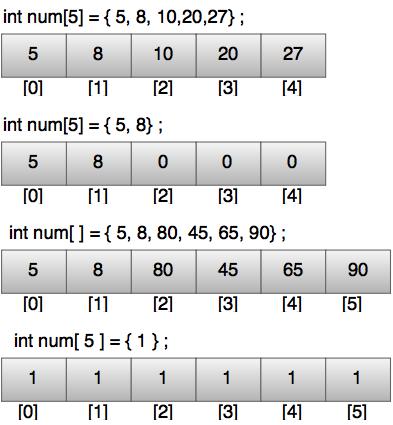Arrays in C Programming
Introduction
- An array is a collection of similar data elements.
- They generally have the same data types.
- Instead of declaring variables individually, arrays help to declare them all together.
- All the elements of an array are accessed with the help of an index.
- They have continuous memory location.

- In the above figure you can see the elements and the index that are alloted to them.
- We can have as many elements as we want in an array.
Definition and Declaration of arrays
- An array is defined in the same way as variables.
- The only difference is that of the size-specifier which tells us the size of the array.
Syntax:
data-type array-name [array-size];
Where,
data-type - all the array elements should have the same data-type. Any valid data-type of C can be taken.
array-name - is the name of the array.
array-size - it specifies the size of the array. It tells how many elements are present in the array.
- The square brackets will tell us that we are dealing with an array in that particular program.
- They will use a continuous memory.
- The size of an array is optional. If the size is specified it should be matched with the definition.
- An array declaration cannot have the initial values.
There are two ways of declaring an array:
1.
void main()
{
int arr[10]; // Array declaration
...................
...................
}
2.
void main()
{
extern arr[ ]; // Array declaration
..................
..................
}
Accessing the elements of an array
An array element is accessed by using a subscript i.e. the index number is used.
Example: To show how elements are accessed
double bonus = arr[5];
- In the above example, you can see that the 6th element will be accessed and the action will be performed on that.
- A loop is used for accessing all the elements of an array.
- The value of the subscript may vary and it should be an integral value or an expression that evaluates to an integral value.
Example: Setting each element of the array to 2
int i, arr[10];
for (i=0; i<10; i++)
arr[i] = 2;
- All the elements of the array will be set to 2.
- Due to the for loop first value of arr[0] is set to 2 and it will keep on going till arr[9].
Initialization of arrays
The elements in an array can be initialized when they are declared.
Syntax:
data-type array-name[array-size] = {list of values};
- The elements of the array are not initialized by default.
- It contains garbage value, so before the array is used it must be initialized or should read some meaningful data in it.


